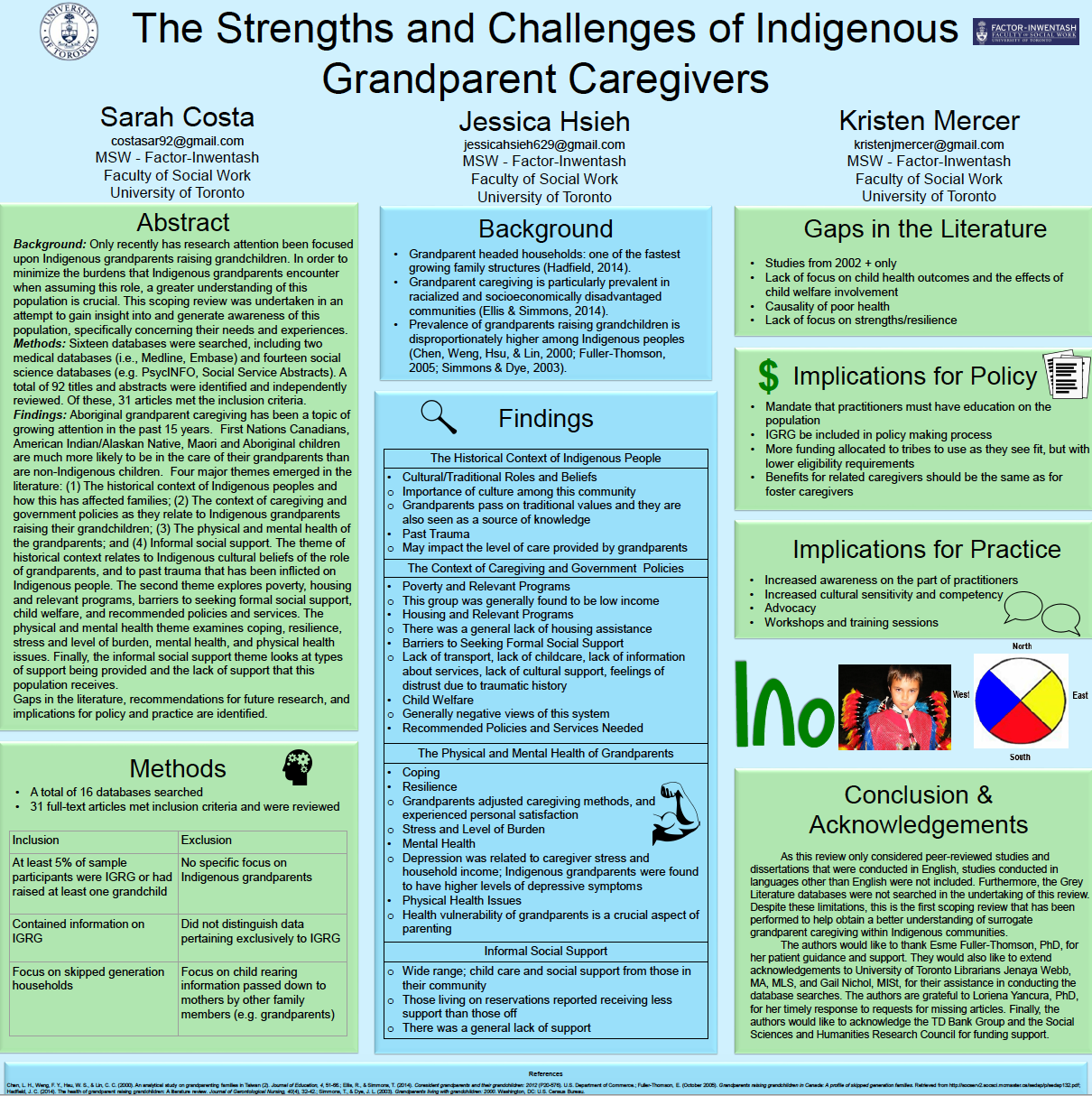- Details
- Published: 19 July 2016
by Kristen Mercer, Sarah Costa and Jessica Hsieh, University of Toronto.
This past month, we celebrated both World Elder Abuse Awareness Day (June 15), National Aboriginal Day (June 21), and National Aboriginal History month. What a key time to explore the intersection of these two topics! We recently graduated from the Master of Social Work program at the University of Toronto, with a specialization in gerontology. Through this program, we were able to conduct a review of the existing academic literature on the topic of our choice, and decided to focus on Indigenous grandparents raising their grandchildren, as this area has been under-researched up to this point.
While this topic is certainly attracting more attention, much is still unknown about this particular section of the Canadian population. In conducting our review, we were shocked to find that the earliest research on this topic was only completed in 2002. We were still able to find a number of interesting themes, largely focusing on the struggles of Indigenous grandparents and the lack of informal and formal support they experience. However, it wasn’t until completing the review and presenting it at the Annual National Initiative for the Care of the Elderly’s Knowledge Exchange, that we noticed a lack of focus on elder abuse among Indigenous grandparent caregivers in the academic literature. This is quite worrisome, considering multiple sources noted that grandparents often become the primary caregivers of their grandchildren due to social issues facing their adult children, such as domestic abuse or child abuse. So why is elder abuse left out of this area of research?
Certainly research and information exist on the abuse of Indigenous elders, but not specifically focusing on Indigenous grandparent caregivers. Could it be that they face less abuse than the general population thanks to traditions which demand greater respect for elders? We know that elder abuse occurs in all cultures, socio-economic levels, religions, etc., so this part still remains unclear. Perhaps there is even a greater stigma surrounding elder abuse in Indigenous cultures because it goes directly against those aforementioned traditional beliefs. Perhaps Indigenous grandparents do experience elder abuse but feel shame and discomfort in having to disclose this fact to others. Perhaps this gap in the literature has arisen because it is often already difficult to discuss the circumstances surrounding Indigenous grandparent caregiving, and to delve that deep into the situation is uncommon and uncomfortable. The complexities of Indigenous grandparent caregiving are great, and this area must be further explored. We did notice in our review that a greater attention was placed on the grandchildren than the grandparent; however, in order for the grandchild to be well, the same must be true of the grandparent. There can be many presumptions about this gap in the literature, all of course coming from an outside perspective.
Efforts need to be made by the research community to include Indigenous grandparents in conversations on how to specifically address the issue of elder abuse in their communities. Doing so will allow researchers to better understand the needs and concerns of these grandparents; however, researchers cannot afford to wait for Indigenous grandparents to approach them with a list of concerns. There is currently very little research on elder abuse among Indigenous communities, and to achieve the goal of advancing knowledge in this area, it is vital for the research community to reach out, engage, and consult with Indigenous grandparents. Forming relationships with Indigenous grandparents is the first, and arguably the most important, step that the research community will need to take. More research in this area would be extremely beneficial, not only in allowing us to gain a more complete picture of what life is like for Indigenous grandparent caregivers, but also in aiding practitioners to better support them.
If you would like more information on the findings from our scoping review, please email Kristen Mercer at , Sarah Costa at , and Jessica Hsieh at .
About the authors
 Kristen Mercer discovered her passion for gerontology at the University of Guelph, where she completed a Bachelor of Applied Science, majoring in Adult Development. She continued on to the Master of Social Work program at the University of Toronto, where she specialized in Gerontology. She graduated from this program in June 2016 and is now working with the National Initiative for the Care of the Elderly (NICE), as well as in long term care.
Kristen Mercer discovered her passion for gerontology at the University of Guelph, where she completed a Bachelor of Applied Science, majoring in Adult Development. She continued on to the Master of Social Work program at the University of Toronto, where she specialized in Gerontology. She graduated from this program in June 2016 and is now working with the National Initiative for the Care of the Elderly (NICE), as well as in long term care.

Jessica Hsieh completed a Bachelor of Arts in 2013 at York University, where she majored in Psychology. She obtained her Master of Social Work with a specialization in Gerontology from the University of Toronto in June 2016.
Jessica is currently working with the National Initiative for the Care of the Elderly (NICE) on a study exploring financial literacy among Aboriginal grandparents.
 Sarah Costa received her Bachelor of Applied Science in Family and Community Social Services in 2014 from the University of Guelph. In June 2016, she completed her Master of Social Work with a specialization in Gerontology. Sarah is currently working with at-risk seniors, providing them with community-based support to ensure their well-being.
Sarah Costa received her Bachelor of Applied Science in Family and Community Social Services in 2014 from the University of Guelph. In June 2016, she completed her Master of Social Work with a specialization in Gerontology. Sarah is currently working with at-risk seniors, providing them with community-based support to ensure their well-being.
Related resources
- On the blog: Spotlight on CanGrands National Kinship Support
- Legal Information & Resources For Ontario Grandparents Raising their Grandchildren


















